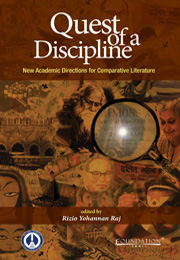Book contents
- Frontmatter
- Contents
- List of Contributors
- Acknowledgements
- Prologue to the “Quest'
- Introduction
- PART I Traditions and Manifestoes: Reflecting on Perspectives
- 1 The Comparatist as Teacher: Teaching Indian Literatures through a Comparative Methodology
- 2 Comparative Literature: Methodology and Challenges in Europe with Special Reference to the French and German Contexts
- 3 ‘Lone Starring’ Comparative Literature in US English Departments
- PART II The Quest Motif: Redefining the Scope of Comparative Literature
- PART III The Dynamics of Exchange: Genres, Areas and Disciplines
- PART IV India: A Curious Comparative Space
- Afterword: Comparative? Literature?
- Index
2 - Comparative Literature: Methodology and Challenges in Europe with Special Reference to the French and German Contexts
from PART I - Traditions and Manifestoes: Reflecting on Perspectives
Published online by Cambridge University Press: 05 June 2012
- Frontmatter
- Contents
- List of Contributors
- Acknowledgements
- Prologue to the “Quest'
- Introduction
- PART I Traditions and Manifestoes: Reflecting on Perspectives
- 1 The Comparatist as Teacher: Teaching Indian Literatures through a Comparative Methodology
- 2 Comparative Literature: Methodology and Challenges in Europe with Special Reference to the French and German Contexts
- 3 ‘Lone Starring’ Comparative Literature in US English Departments
- PART II The Quest Motif: Redefining the Scope of Comparative Literature
- PART III The Dynamics of Exchange: Genres, Areas and Disciplines
- PART IV India: A Curious Comparative Space
- Afterword: Comparative? Literature?
- Index
Summary
INTRODUCTION
Two thousand years or two hundred? That is the question. Indeed, one may wonder whether the history of Comparative Literature goes back about 2000 years to the Greek times or the nineteenth century should be considered the starting point. In their introductions to the discipline, Western (American and European) comparatists, usually opt for the first alternative. Without any doubt, comparison as such has always existed, and it will be demonstrated by some famous examples in the following chapter. However, our concern here is to trace the emergence of Comparative Literature as an academic discipine in order to better understand the theories and methodologies adopted by the European comparatists, especially those in France and Germany, and the challenges they face in their pursuits today.
The Forthcoming of Comparative Literature as an Academic Discipline
If we consider comparison a general mode of understanding, as used by the French philosopher Descartes, who declared that we come to know the truth only by comparison, we may actually go back to Aeschylus. His earliest play, The Persians, deals with the Battle of Salamis. In order to describe the Persian defeat, the Greek playwright adopts the point of view of the Persian royal court. After the Greek era, we see the orator Cicero, who introduced Greek philosophy to the Romans, thus leading to the creation of a philosophical Latin language. Dante is another significant reference in the history of the largely conceived notion of comparison as a mode of understanding.
- Type
- Chapter
- Information
- Quest of a DisciplineNew Academic Directions for Comparative Literature, pp. 29 - 48Publisher: Foundation BooksPrint publication year: 2012



